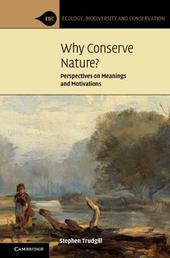
|
Why Conserve Nature?: Perspectives on Meanings and Motivations
Paperback / softback
Main Details
Description
How we view nature transforms the world around us. People rehearse stories about nature which make sense to them. If we ask the question 'why conserve nature?', and the answers are based on myths, then are these good myths to have? Scientific knowledge about the environment is fundamental to ideas about how nature works. It is essential to the conservation endeavour. However, any conservation motivation is nested within a society's meanings of nature and the way society values it. Given the therapeutic and psychological significance of nature for us and our culture, this book considers the meanings derived from the poetic and emotional attachment to a sense of place, which is arguably just as important as scientific evidence. The functional significance of species is important, but so too is the therapeutic value of nature, together with the historic and spiritual meanings entwined in a human feeling for landscape and wildlife.
Author Biography
Stephen Trudgill is an Honorary Vice-President of the Field Studies Council and an Emeritus Fellow in Geography at Robinson College, Cambridge University, where he is Chair of the Gardens Committee and member of the Visual Arts Committee. . He formerly lectured on the social engagement with nature, biogeography, soils, nature conservation and environmental management in the Department of Geography at Cambridge University. He has experience of Nature Reserve Management Committees in Slapton Ley National Nature Reserve, Devon and community conservation near Cambridge. He has written, edited and co-edited seven books to date. He was also a contributor to the recently published Cambridge book, Curious About Nature (Burt and Thompson, EBC, 2019).
|